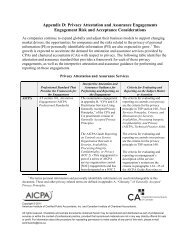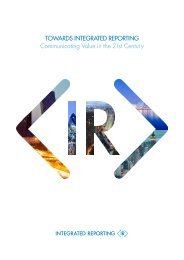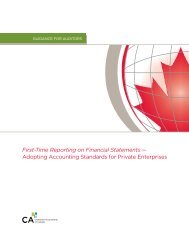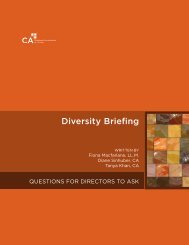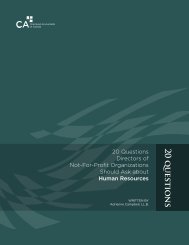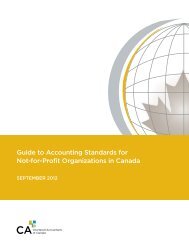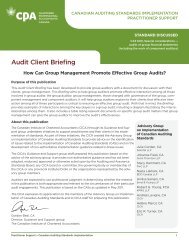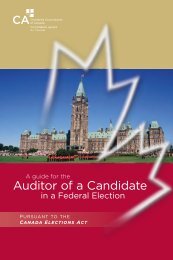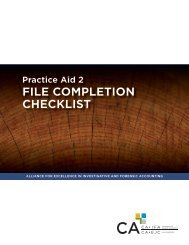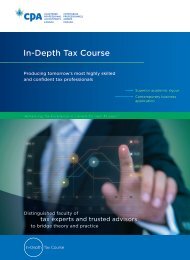20 Questions Directors of Not-for-Profit Organizations Should Ask ...
20 Questions Directors of Not-for-Profit Organizations Should Ask ...
20 Questions Directors of Not-for-Profit Organizations Should Ask ...
Create successful ePaper yourself
Turn your PDF publications into a flip-book with our unique Google optimized e-Paper software.
<strong>20</strong> <strong>Questions</strong> <strong>Directors</strong> <strong>of</strong> <strong>Not</strong>-For-Pr<strong>of</strong>it <strong>Organizations</strong><br />
<strong>Should</strong> <strong>Ask</strong> about Board Recruitment, Development and Assessment<br />
Time Commitments<br />
• In-person attendance at meetings;<br />
• Preparation <strong>for</strong> meetings;<br />
• Travel;<br />
• Committee service;<br />
• Participation in orientation, educational and<br />
strategic planning sessions;<br />
• Working with staff;<br />
• Availability <strong>for</strong> unscheduled meetings and<br />
phone calls;<br />
• Attendance at events;<br />
• Serving as an ambassador <strong>for</strong> the<br />
organization;<br />
• Special requests or initiatives on behalf <strong>of</strong><br />
the organization.<br />
10. What references and background checks<br />
are appropriate<br />
<strong>Directors</strong> <strong>of</strong> NPOs have a fiduciary role as stewards<br />
<strong>of</strong> the organization’s assets and resources. This<br />
includes oversight <strong>of</strong> the use <strong>of</strong> donor funds and<br />
the delivery <strong>of</strong> programs and activities. Many NPOs<br />
work with vulnerable members <strong>of</strong> the community.<br />
Boards should ensure that all necessary steps are<br />
taken to satisfy themselves that a prospective<br />
director possesses the qualifications that<br />
have been represented, is honest, and has no<br />
undisclosed conflicts <strong>of</strong> interest.<br />
refine the short list <strong>of</strong> suitable candidates and avoid<br />
surprises, embarrassment or regret in the more <strong>for</strong>mal<br />
referencing process or after the candidate is asked to<br />
serve.<br />
Depending on their nature, these reference checks<br />
may be undertaken by the chair, another member <strong>of</strong><br />
the governance committee or board, a trusted senior<br />
staff member, or other individual who is experienced<br />
in reference checking. Reference checking should<br />
be as objective as possible and personal biases<br />
should be minimized. Significant in<strong>for</strong>mation can be<br />
acquired by a candid and tactful reference check.<br />
Have a Standard Procedure<br />
Police checks are recommended in all cases<br />
when an organization serves a vulnerable<br />
population. Having a standard procedure<br />
in place <strong>for</strong> all volunteers can make the<br />
requirement easier to explain to potential<br />
directors.<br />
If prospective directors are deemed suitable, the<br />
organization should obtain their permission to<br />
conduct supplemental background checking and<br />
verification. This may include contacting credit<br />
agencies, obtaining police checks and confirming<br />
with universities and pr<strong>of</strong>essional associations<br />
the credentials and status <strong>of</strong> pr<strong>of</strong>essionals such<br />
as lawyers, accountants, investment advisors,<br />
engineers, etc.<br />
Reference checking can be a lengthy and sensitive<br />
process, but one that can protect an organization<br />
and its beneficiaries against serious consequences.<br />
Why Caution is Necessary<br />
Joining an organization and winning the trust<br />
<strong>of</strong> its members and board is a technique used<br />
by individuals who swindle organizations out<br />
<strong>of</strong> funds or otherwise abuse their position and<br />
damage the reputation <strong>of</strong> the organization.<br />
In many cases, the individuals will be known to<br />
people in the organization or to trusted stakeholders<br />
or contacts who can provide additional references.<br />
Where possible, references should be contacted<br />
early in the process to validate statements in a<br />
candidate’s pr<strong>of</strong>ile and declaration and to determine<br />
the candidate’s suitability in terms <strong>of</strong> behavioural<br />
style, track record <strong>of</strong> attendance and contribution,<br />
and cultural fit with the board. By confidentially and<br />
tactfully canvassing individuals who serve with or<br />
know the candidate, any “red flags” can be assessed<br />
with relative ease. This initial due diligence is a way to<br />
13




